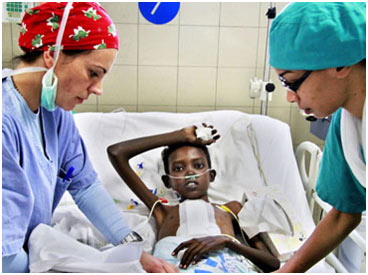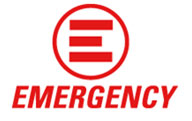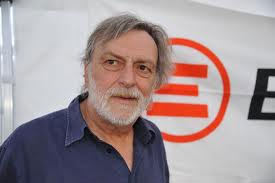History
Over 5.2 million people have received free, high quality health care by EMERGENCY.
One in three was a child.
EMERGENCY is an Italian NGO founded in 1994 in order to provide assistance to the civilian victims of war.
From 1994 to the present day, EMERGENCY has worked in 16 countries, building hospitals, Surgical Centres, Rehabilitation Centres, Paediatric Clinics, First Aid Posts, Primary Health Clinics, a Maternity Centre and a Centre for Cardiac Surgery. Subsequent to request from local authorities and other organizations, EMERGENCY has also helped to renovate and equip pre-existing health facilities.
Since 1994, EMERGENCY teams have provided assistance to 5,216,324 people (as of December 31, 2012).
 Every day EMERGENCY deals with the wreckage caused by war and for this very reason EMERGENCY has always been committed to promoting a culture of peace.
Every day EMERGENCY deals with the wreckage caused by war and for this very reason EMERGENCY has always been committed to promoting a culture of peace.
In 1994 EMERGENCY entered the campaign against antipersonnel landmines which brought Italy to ban them.
In 2001, shortly before the war against Afghanistan, EMERGENCY appealed to the Italian people asking them to demonstrate against the impending war with “a white rag for peace” (“uno straccio di pace”).
In September 2002, together with other organizations, EMERGENCY launched a huge campaign to prevent Italy from taking part in the war against Iraq.
At the same time, EMERGENCY promoted a nationwide petition campaign called “Stop the war, sign for peace” to ask for the enforcement of Article 11 of the Italian Constitution, which repudiates any act of war. The petition was submitted to Parliament in June 2003.
In 2008, with some African countries, EMERGENCY has elaborated the Manifesto for a Human Rights Based Medicine asking for a medicine based on Equality, Quality and Social responsibility.
EMERGENCY is a recognized charitable organization (1998) and Non-Governmental Organization (1999).
In 2006 EMERGENCY became an NGO partner of the United Nations Department of Public Information.
In 2010, EMERGENCY promoted the manifesto “The Manifest We Want” asking for a fairer world.
In order to support EMERGENCY’s goals on a broader international scale, in 2008 the volunteers of the numerous chapters operating throughout the US since 2005 founded EMERGENCY USA.
For the same purposes, EMERGENCY UK was founded in November 2007 (visit EMERGENCY UK website). EMERGENCY Japan started its activities in early 2011 (visit EMERGENCY Japan website), as well as EMERGENCY Switzerland, which later became EMERGENCY Switzerland Foundation.
The world we want
We believe in the equality of all human beings, regardless of their opinions, sex, race; of their ethnic, political, religious background and belonging; of their social status and financial condition.
We repudiate the use of violence, terrorism and war as instruments to resolve the disputes between individuals, peoples, nations. We want a world based on social justice, on solidarity, on reciprocal respect, on dialogue, on an equal distribution of resources.
We want a world in which governments guarantee the basic equality of all members of society and the right to medical treatment that is both of a high standard and free; the right to a public education system that develops each person, each human being, enriching their knowledge and intellect; the right to free information media.
In our own Country, instead, for many years now we’ve witnessed the progressive and systematic destruction of any and all principles of social, human cohabitation. A most severe and savage drift is before our eyes.
In the name of “international alliances”, the Italian political class has chosen war and aggression against other Countries.
In the name of “freedom”, the Italian political class has chosen war against its own citizens, building a system of privileges based upon exclusion and discrimination, a system of arrogant prevarication, of ordinary, daily corruption.
In the name of “security”, the Italian political class has chosen war against those who come to Italy to survive, instigating hatred and racism against them.
Is this a democracy? Simply because it involves electoral processes of representativeness? Is the act of voting enough for a Country to be defined as “democratic”?
To us, a political system is democratic only if it works for the common well-being, favouring in its actions the needs of the underprivileged, the needs of the weakest social groups, to better their living conditions, so that we may all be a society of citizens.
This is the world we want. For ourselves, for all of us. A world of equality


